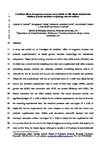Combined effects of exogenous enzymes and probiotic on Nile tilapia (Oreochromis niloticus) growth, intestinal morphology and microbiome
| dc.contributor.author | Merrifield, Daniel | |
| dc.date.accessioned | 2016-08-03T07:56:50Z | |
| dc.date.issued | 2016-10-01 | |
| dc.identifier.issn | 0044-8486 | |
| dc.identifier.issn | 1873-5622 | |
| dc.identifier.uri | http://hdl.handle.net/10026.1/5165 | |
| dc.description.abstract |
A study was carried out to investigate the combined effect of exogenous enzymes and probiotic supplementation on tilapia growth, intestinal morphology and microbiome composition. Tilapia (34.56 ± 0.05 g) were fed one of four diets (35% protein, 5% lipid); one of which was a control and the remaining three diets were supplemented with either enzymes (containing phytase, protease and xylanase), probiotic (containing Bacillus subtilis, Bacillus licheniformis and Bacillus pumilus) or enz-pro (the combination of the enzymes and probiotic). Tilapia fed diet supplemented with enz-pro performed better (P < 0.05) than tilapia fed the control and probiotic supplemented diets in terms of final body weight (FBW), specific growth rate (SGR), feed conversion ratio (FCR) and protein efficiency ratio (PER). The dietary treatments did not affect somatic indices. The serum lysozyme activity was significantly higher (P < 0.05) in tilapia fed the probiotic supplemented diet than of those fed the remaining experimental diets. The intestinal perimeter ratio was higher (P < 0.05) in tilapia fed enz-pro supplemented diet when compared to those fed with the control and probiotic supplemented diets. Goblet cells abundance, microvilli diameter and total enterocyte absorptive surface was higher (P < 0.05) in tilapia fed diet supplemented with enz-pro than those fed the control diet. High-throughput sequencing revealed that majority of reads derived from the tilapia digesta belonged to members of Fusobacteria (predominantly Cetobacterium) distantly followed by Proteobacteria and Firmicutes. The alpha and beta diversities did not differ among dietary treatments indicating that the overall microbial community was not modified to a large extent by dietary treatment. In conclusion, supplementation of the diet with a combination of enzymes and probiotic is capable of improving tilapia growth and intestinal morphology without deleterious effect on the intestinal microbial composition. Statement of relevance: 1.Intensive operations in aquaculture are often accompanied by sub-optimum environmental conditions which may be stressful for fish.2.The production of high quality aquafeed with optimal growth and immune boosting effects could benefit intensive aquaculture operations.3.Dietary supplementation of exogenous digestive enzymes and probiotic as a cocktail may result in complimentary mode of action.4.Previous studies did not investigate the combined effects of exogenous digestive enzymes and probiotic on Nile tilapia. | |
| dc.format.extent | 61-70 | |
| dc.language | en | |
| dc.language.iso | en | |
| dc.publisher | Elsevier BV | |
| dc.subject | Enzymes | |
| dc.subject | Probiotic | |
| dc.subject | Histology | |
| dc.subject | Microbiome | |
| dc.subject | High-throughput sequencing | |
| dc.subject | Tilapia | |
| dc.title | Combined effects of exogenous enzymes and probiotic on Nile tilapia (Oreochromis niloticus) growth, intestinal morphology and microbiome | |
| dc.type | journal-article | |
| dc.type | Journal Article | |
| plymouth.author-url | https://www.webofscience.com/api/gateway?GWVersion=2&SrcApp=PARTNER_APP&SrcAuth=LinksAMR&KeyUT=WOS:000381010800010&DestLinkType=FullRecord&DestApp=ALL_WOS&UsrCustomerID=11bb513d99f797142bcfeffcc58ea008 | |
| plymouth.volume | 463 | |
| plymouth.publication-status | Published | |
| plymouth.journal | Aquaculture | |
| dc.identifier.doi | 10.1016/j.aquaculture.2016.05.028 | |
| plymouth.organisational-group | /Plymouth | |
| plymouth.organisational-group | /Plymouth/Faculty of Science and Engineering | |
| plymouth.organisational-group | /Plymouth/Faculty of Science and Engineering/School of Biological and Marine Sciences | |
| plymouth.organisational-group | /Plymouth/REF 2021 Researchers by UoA | |
| plymouth.organisational-group | /Plymouth/REF 2021 Researchers by UoA/UoA06 Agriculture, Veterinary and Food Science | |
| plymouth.organisational-group | /Plymouth/Users by role | |
| plymouth.organisational-group | /Plymouth/Users by role/Academics | |
| plymouth.organisational-group | /Plymouth/Users by role/Researchers in ResearchFish submission | |
| dcterms.dateAccepted | 2016-05-17 | |
| dc.rights.embargodate | 2017-5-21 | |
| dc.identifier.eissn | 1873-5622 | |
| dc.rights.embargoperiod | 12 months | |
| rioxxterms.versionofrecord | 10.1016/j.aquaculture.2016.05.028 | |
| rioxxterms.licenseref.uri | http://www.rioxx.net/licenses/under-embargo-all-rights-reserved | |
| rioxxterms.licenseref.startdate | 2016-10-01 | |
| rioxxterms.type | Journal Article/Review |


